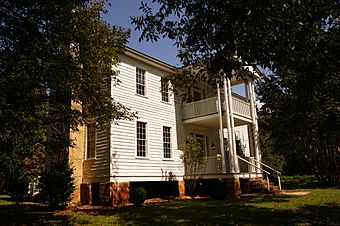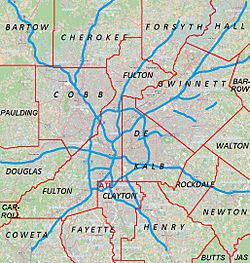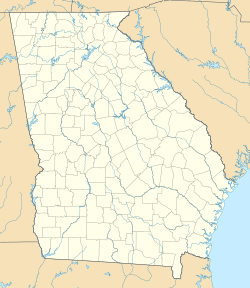Elisha Winn House facts for kids
Quick facts for kids |
|
|
Elisha Winn House
|
|
 |
|
| Nearest city | Dacula, Georgia |
|---|---|
| Built | 1812 |
| Architectural style | Plantation-Plain |
| NRHP reference No. | 79000728 |
| Added to NRHP | December 18, 1979 |
The Elisha Winn House is a very old and important building located near Dacula, Georgia, in the United States. It stands about 1.9 miles (3.1 km) north of Dacula's city limits. This house, which is now in Gwinnett County, was built in 1812. That was six years before Gwinnett County was even officially formed!
In 1809, Elisha Winn, Roger Pugh, and Elijah Pugh bought a large area of land, about 7,300 acres (30 km²), near the Apalachee River. This land was purchased from a tax collector in Jackson County. On December 15, 1818, the Elisha Winn house and its property officially became part of the new Gwinnett County. Today, the Elisha Winn House is the oldest building still standing in Gwinnett County. It is likely the oldest building in the entire metropolitan Atlanta area.
Contents
The House's Important History
The Elisha Winn House became very important because it was part of the brand-new Gwinnett County. A lot of the planning for the new county happened right here. The first government activities for Gwinnett County were carried out at the house and even in its backyard!
Early court sessions, called the Superior Court, were held in Winn's barn from 1819 to 1822. These courts served Gwinnett County and several other nearby counties. The first county elections and meetings of the Inferior Court took place in the parlor of the Elisha Winn House. By 1819, Gwinnett County had all its elected officials thanks to these early meetings.
The first jail for Gwinnett County was also built on the property. It was a small barn in the backyard, which was later taken down in August 1933. Elisha Winn himself was one of the first five judges of the Inferior Court, starting in February 1819. In 1820, a new town called Lawrenceville was created to be the permanent center for the county government. A wooden courthouse was built there, and the county government moved. The Winn family moved to Lawrenceville in 1824, where Elisha Winn continued to serve in the county government.
Who Was Elisha Winn?
Elisha Winn was born in Lunenburg, Virginia in 1777. He passed away on March 4, 1842, and is buried in the old Lawrenceville cemetery. He was married to Judith Cochran, and they had 13 children together.
Elisha Winn was a public servant for many years. From 1815 to 1817, he was a Justice of the Inferior Court in Jackson County. Then, from 1820 to 1825, he served as an Inferior Court judge for Gwinnett County. He also represented Gwinnett County as a state senator for Georgia in 1830, 1833, and 1837.
Other Buildings on the Property
The Elisha Winn House property is home to several other interesting historical buildings.
- The original barn, which served as Gwinnett County's first courthouse and jail, was taken down in 1945. Its wood was used to build a new barn. This second barn had electricity added in 1982 but collapsed in 1997. It was 32 feet (9.8 m) square and had two floors and an attic. [1]
- The Lawrenceville Jail is a log jail built in the 1820s. It was moved to the Winn property in 1986, to the spot where the original county jail once stood. This new jail looks very similar to the first one. [2] Some famous people held in the original jail were the Moravian missionaries involved in the Cherokee Nation v. Georgia case, including Samuel Worcester, while they waited for their trial in 1831.
- The cotton house was given to the historical society in 2001 and moved to the Winn property in 2002. [3]
- Walnut Grove School was a one-room schoolhouse built in 1875. It was moved several times before being donated to the historical society in 1985. It was then placed in the backyard of the Winn house. The society worked to make the school look just like it did in 1875. [4]
- The Clack Blacksmith Shop was donated in 2000. This building was originally built in 1910. [5]
- An outhouse was donated in 2001. A member of the historical society used a model of the original outhouse to build a new one. It was made from old wood, including some from the donated outhouse. [6]
Annual Elisha Winn Fair
Every year, on the first weekend of October, the Elisha Winn Fair takes place. The Gwinnett Historical Society sponsors this fair. It's a fundraiser to help keep the historic house in good condition. The fair celebrated its 34th anniversary on October 6 and 7, 2012, which also marked the house's 200th birthday!
The Elisha Winn House is officially listed on the National Register of Historic Places. There is also a Georgia Historic Marker at the site, telling visitors about its importance.
Images for kids
 | Percy Lavon Julian |
 | Katherine Johnson |
 | George Washington Carver |
 | Annie Easley |





